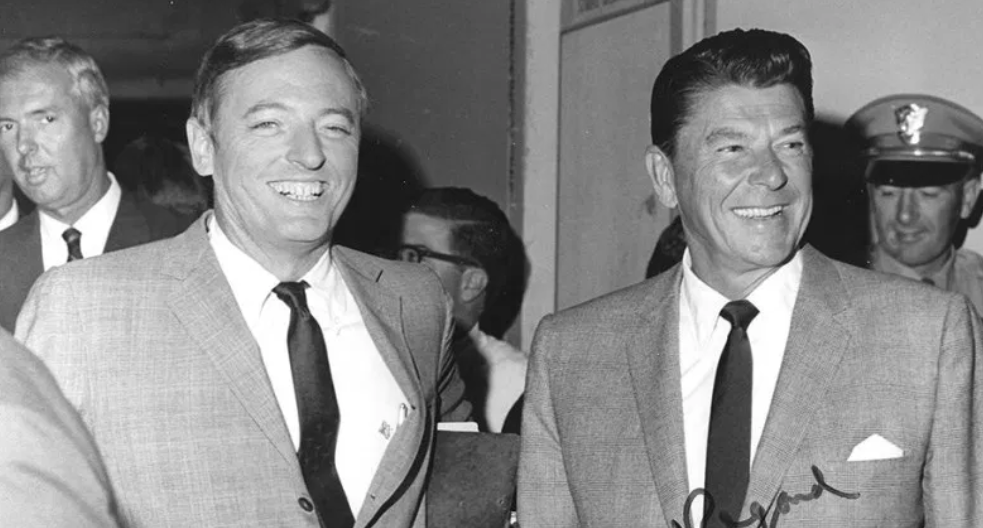To object that the use of impeachment power is “anti-democratic” is to miss the point: democracy yields to the Constitution, not the other way around.
The Cold War Conservatives Who Influenced Reagan
In one sense Laurence R. Jurdem’s new book is like a time capsule for those with a deep interest in American conservative political history. In the course of Paving the Way for Reagan: The Influence of Conservative Media on U.S. Foreign Policy, we see the emergence of Human Events, National Review, and Commentary as influential journals of opinion. They had their idiosyncrasies but were united on how they positioned the United States as a strong, global opponent of communism. We see controversies that once preoccupied the political classes—Vietnam, SALT II, Rhodesia, China’s admission to the United Nations and its threatening of Taiwan. Figures such as Muammar Gaddafi and Robert Mugabe dominate the book. Hard to see many millennials knowing who or what any of these are, or why they mattered.
And yet. Mugabe is still around, if out of power in Zimbabwe. Gaddafi, killed after being overthrown as Libya’s dictator, remains part of American consciousness. And China is still pushing to isolate Taiwan, most recently by forming stronger economic ties with other Pacific islands. More important for the purposes of this book, the conservative media are still around, though changed and still changing. So Paving the Way for Reagan comes at an opportune time to examine the legacy of the conservative media, at least in the area of foreign policy.
Jurdem’s account helps explain, in a roundabout way, how figures like David Frum, Bill Kristol, Max Boot, and others thought they could convert America into a permanent war machine against “Islamofascism” after the attacks of September 11, 2001. Conservative media have been arguing for military intervention and an aggressive foreign policy for decades. This book analyzes attempts by media conservatives to change crucial foreign policy decisions from the time of the Vietnam War up to Reagan’s victory in the presidential election of 1980. It focuses on three journals, Human Events, National Review, and Commentary and their respective editors, Allan Ryskind, William F. Buckley, Jr., and Norman Podhoretz.
The Liberals’ Failure of Nerve
Human Events (which in 2013 became an online-only publication, and which was purchased recently by new owners intending to relaunch it under a pro-Trump banner) is the oldest, having been founded in 1944 by conservatives upset with Franklin Roosevelt and the big government programs of the New Deal. Of the three, it focused perhaps the most on publishing news stories as opposed to opinion.
National Review, founded in 1955, was and is a broader journal, owing to founder Buckley’s more diverse interests, and his clearer desire (as Jurdem astutely notes) to remain within the corridors of power.
Commentary, founded in 1945 by the American Jewish Committee, came more fully to the anticommunist cause later in the 1960s, once Podhoretz and others became disillusioned with the New Left. Commentary’s editors’ “move to the Right, particularly in the arena of foreign policy, sent a powerful signal to America’s intellectual elites that the once-vital center of the Democratic Party, symbolized by its passionate commitment to anticommunism, no longer existed.” From about 1968 on, anticommunism became increasingly the occupation of the Right.
In the late 1960s, these journals went on the attack against what they saw as a liberal “failure of nerve” to promote American interests abroad and aggressively to confront the global Soviet threat. “Writers for these publications claimed that the fortunes of the country were being subverted not only abroad but at home,” writes Jurdem. In the face of Soviet and Cuban communism and especially during the withdrawal of U.S. forces from Vietnam, “conservatives believed that a once-active foreign policy that promoted democracy and freedom had been transformed by liberal elites into a policy of appeasement and self-doubt.” Those arguments—until the advent of Donald Trump, at least—remained baseline conservative opinion on foreign policy, though at least since 9/11 there has been an increasing conservative revival of its own antiwar and anti-interventionist traditions.
Jurdem devotes chapters to several key events in U.S. foreign policy, including Vietnam, the SALT II treaty, relations with China, and the United Nations, and ends with the Iranian hostage crisis of 1979, which famously ended shortly after the election of Reagan. In the hindsight of the seemingly never-ending wars in the Middle East that some of these same publications advocated after 9/11, this account makes for at times sobering reading.
Conservatives were vociferous in their resistance to any fallback or withdrawal from Vietnam. When American forces left South Vietnam, conservatives argued for continued economic support for the nation to resist the North, and when South Vietnam finally fell and the United States engaged in peace talks, some conservatives looked for any misstep by North Vietnam to restart the conflict.
And the less said about the Right’s strong support for racist Rhodesia, the better. It is impossible to read National Review’s support for Rhodesia outside of its then-antipathy toward the American civil rights movement. National Review supported Rhodesia’s separation from Great Britain for complicated (some might say opaque) anticommunist reasons. Jurdem summarizes the view of people like senator and presidential candidate Barry Goldwater (R-Ariz.) as believing that “when the United States penalized a ‘friendly nation,’ it sent communist states the message that supporting its close ally Great Britain was more important than taking a strong position in the Cold War,” because Britain had trading interests with communist countries. The magazine went so far as to call Rhodesia’s Ian Smith that nation’s “George Washington.”
Nixon and the Right: A Tense Relationship
Similarly with SALT II and the Soviet Union. Here, as throughout, Jurdem has conducted thorough research among the relevant publications’ archives, and has done lengthy interviews. The Strategic Arms Limitations Talks were meant as a way to de-escalate the arms race with the Soviet Union. In May 1971, Nixon announced an agreement with the Russians regarding limits on the use of antiballistic missiles. But this was viewed by conservatives as a show of weakness.
Nixon’s tense relations with the Right are a recurring theme. Jurdem highlights a rare unpublished column by Buckley, in which the National Review editor listed the ways in which Nixon had, he felt, betrayed conservative principles in his negotiations with the Russians. The 37th President, for his part, never quite forgave conservatives for not supporting him in the early 1960s, or for failing to understand that negotiations needed to run both ways. Nixon’s National Security Advisor and later Secretary of State, Henry Kissinger, and Nixon aide Pat Buchanan were employed as go-betweens to keep channels of communication open with the Right. (This mostly meant with Buckley; Nixon had little time for Human Events or most other conservative commentators.) Conservatives, especially Buckley and senior National Review writer James Burnham, remained respectful of Kissinger but saw him (and President Nixon) as too pragmatic.
Their suspicions were only confirmed by Nixon’s visit to China. Buckley, one of the editors and journalists who accompanied Nixon on that trip, according to Jurdem “charged that the great struggle against communism—a war that many believed as one of good against evil—had now evaporated.” The decision of the Carter administration to open a formal relationship with Beijing was cause for further anguish on the Right.
So Jurdem is correct that conservative publications paved the way for Reagan, and he shows that Reagan was reading Human Events and National Review since his General Electric days. At times, Reagan cribbed directly from these publications to attack those seen as softer on communism. Likewise members of Congress (particularly Senators John Tower of Texas and Strom Thurmond of South Carolina) used conservative editorials to bolster their own arguments. Reagan’s staunch anticommunist stance found support and confirmation in the editorials and articles he spent decades reading.
Dictatorships and Double Standards
Commentary, although important in its own right, especially after it became more clearly associated with the neoconservative cause, receives the least attention of the three in this study, with one significant exception: the 1979 article by Georgetown political scientist Jeane J. Kirkpatrick, “Democracy and Double Standards,” which was to have a big influence on the Reagan administration. Kirkpatrick, who was to become Reagan’s ambassador to the United Nations, argued that America had misunderstood the ideological revolutions that were toppling states that had been allies, and that we should be friendly to non-democratic regimes (such as Iran under the shah) that were friendly to us. As Jurdem phrases it, Kirkpatrick argued that “whereas autocracies had the capacity for change, societies under the totalitarian system could not alter themselves, as it was not the rulers but the principles of communism that held control.” Thus conservatives’ support for all manner of regimes so long as they were not totalitarian, that is, communist.
The conservative media’s scorecard is decidedly mixed. Conservatives opposed the peace talks with Vietnam, and lost. They opposed the opening to China, and lost. SALT II was a more complicated story. The ratification of the treaty was delayed by the Soviet invasion of Afghanistan in 1980, and voted down by the Senate Armed Services Committee headed by neoconservative hero Senator Henry “Scoop” Jackson (D-Wash.). But even in the mid-1980s, Reagan argued for abiding by the terms of arms-limitations treaties so long as the Soviets displayed the same restraint, which did not sit well with some conservatives. On whether or not the United States should relinquish control of the Panama Canal, the positions were switched: Buckley, who favored transferring the canal to Panama, famously debated this with his friend Reagan, who opposed it (as did Human Events).
All of these controversies need to be seen in light of the real threat emanating from Leonid Brezhnev’s Soviet Union, and the mood of the country was, throughout this period, still heavily in support of efforts to resist communism. Yet it is also clear that conservative publications—themselves often staffed by those like Burnham and Frank Meyer, who were apostates from the Soviet cause—were apt to see every conflict through that lens, whether this was called for or not.
Jurdem writes that the three journals he has singled out “viewed the dominant foreign policy events of the 1960s and 1970s through a specific ideology that eventually came to define the activist agenda of the Reagan Administration in regard to the Cold War.” True enough, but there were two strands to this ideology. Some conservatives, like Ambassador Kirkpatrick, were fine with authoritarian regimes so long as they were not communist. But another side of conservative foreign policy writing existed alongside this realpolitik position: that American power should be used specifically to promote democracy against any non-democratic regime.
This ambiguity is not brought out too clearly by Jurdem. President Reagan in fact used both kinds of rhetoric in his speeches. And once the Cold War ended, the democracy-promotion strand remained, and grew stronger. The mistake these journals made was to confuse this activist agenda with conservatism itself.



